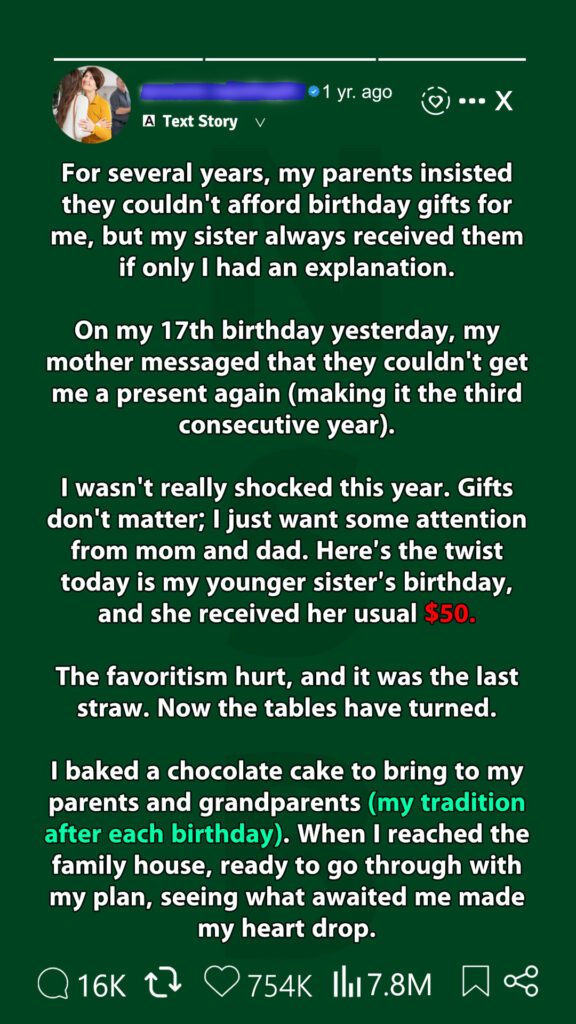Every year, my birthday felt like a reminder—not of celebration, but of absence. No gifts. No cake. Just silence. And the same text from my parents: “Sorry, honey. We can’t afford anything this year.”
I’m Audrey. Seventeen. The older daughter. The invisible one.
For the past three years, my birthdays came and went like shadows. No parties. No cards. No hugs. But two months later, when my younger sister Lily’s birthday arrived, the house transformed. Balloons. Laughter. A crisp $50 bill handed to her with a smile. Every year. Like clockwork.
I told myself it was about timing. Maybe they were struggling financially when my birthday came around. Maybe things improved by Lily’s. But deep down, I knew better. It wasn’t about money. It was about something else. Something unspoken.
I tried to talk to them. I asked if I’d done something wrong. They brushed me off. “Don’t be dramatic,” Mom said. “We love you both the same.” But love doesn’t feel like silence. It doesn’t feel like being forgotten.

The only people who made me feel seen were my grandparents. They’d take me out for ice cream, give me small gifts, ask about school. They didn’t have much, but they gave me what mattered—attention.
This year, I decided to stop waiting. I baked my own birthday cake. Chocolate, with raspberry filling. It’s a tradition now—every year, I bake it the day after my birthday and bring it to my parents’ house for Lily’s celebration. It’s the only way I feel included. Even if it’s not really for me.
But this year was different.
I walked into the house with the cake, expecting the usual: Lily surrounded by gifts, my parents too busy to notice me. Instead, I found them in the living room, whispering. My name came up. I froze.
“She’s going to find out eventually,” Dad said.
Mom sighed. “We did what we had to do.”
I stepped in. “Find out what?”
They looked at me like I’d caught them stealing.
Then the truth spilled out.
When I was a baby, I had a rare medical condition. The treatments were expensive. My grandparents helped, but my parents took out loans. They struggled for years. And when Lily was born, they made a decision: to give her a “normal” childhood. One without the weight of debt, hospitals, or fear.
They didn’t mean to neglect me. But in trying to protect Lily from the pain I’d endured, they forgot that I still needed love. That healing isn’t just physical—it’s emotional.
I didn’t cry. I didn’t scream. I just stood there, holding the cake I’d baked for a party that wasn’t mine.
Later that night, Lily came to my room. She handed me a small envelope. Inside was $50. “I want you to have this,” she said. “I didn’t know. I’m sorry.”
It wasn’t about the money. It was about being seen.
My parents apologized. They said they’d do better. And maybe they will. But I’ve learned something important: sometimes, the people who hurt you don’t even realize they’re doing it. And sometimes, the healing starts not with their apology—but with your own decision to stop waiting for it.
I still bake my cake every year. But now, it’s for me.


